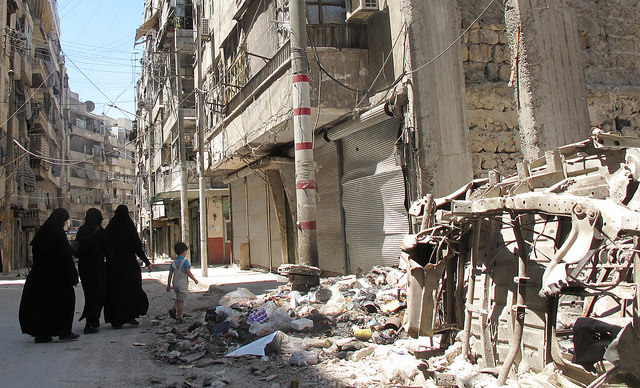Civil Society On Aleppo: UN General Assembly Must Act

UNITED NATIONS, Dec 02 (IPS) - Hundreds of civil society organisations from around the world have united to call on UN member states to step in and demand an end to unlawful attacks in Aleppo.
A global coalition of 223 organisations from over 45 countries including Human Rights Watch, Amnesty International and Physicians for Human Rights have expressed deep concern over the ongoing crisis in Aleppo.
"It's very hard to stand back and watch the slow motion destruction of an entire country and of its civilian population," Human Rights Watch's UN Director Louis Charbonneau told IPS.
Charbonneau noted the destruction caused by the Russian-Syrian coalition's indiscriminate attacks on parts of Syria.
Human Rights Watch found that air strikes, which are often indiscriminate, have killed over 440 civilians, including more than 90 children, between September and October 2016.
Charbonneau cited the al-Sakhour hospital which was allegedly deliberately targeted on four separate occasions.
"When you deliberately target a hospital where doctors and nurses are working to save people's lives, that rises to a special level of war crimes," he told IPS. The hospital has since gone out of service due to extensive damage from strikes.
According to Physicians for Human Rights, Aleppo has seen 45 attacks on its health care facilities in the past three years causing the closure of over two-thirds of hospitals. Approximately 95 percent of doctors have also fled, been detained or killed, further exacerbating the area's humanitarian crisis.
The ongoing conflict has also prevented much needed humanitarian assistance to civilians, including the 250,000 trapped in east Aleppo.
Physicians for Human Rights' Director of International Policy and Partnerships Susannah Sirkin told IPS that this aid blockage is one of the most "egregious obstructions" she has seen in her 30 years of human rights work.
Russian Foreign Minister Sergei Lavrov told reporters in Rome on Friday that there is "no problem" with humanitarian access to East Aleppo.
The coalition particularly pointed to the failure of the Security Council in ending atrocities committed in Syria.
"The Security Council has failed Syrians for the past six years," Amnesty International Representative at the UN Sherine Tadros told IPS, noting Russia's use of vetoes to block action.
Most recently in October, Russia vetoed a draft Security Council resolution which demanded an end to all aerial bombardment of Aleppo. This represents the country's fifth veto on Syria since the conflict began in 2011.
In response to the persistent deadlock, civil society has called on the General Assembly to act.
"If the Security Council won't act, the General Assembly must act," said Tadros.
Charbonneau echoed similar sentiments, stating: "Member states don't simply have an excuse to stand back, they can't hide behind Russia vetoing resolution after resolution. They have a responsibility to do something."
They have called on the General Assembly to request an Emergency Special Session and pass a ‘Uniting for Peace' resolution demanding the cessation of hostilities and unfettered humanitarian access.
Uniting for Peace was first established in the 1950s following vetoes by the Soviet Union and a Security Council deadlock over the Korean War. It has since been used by the General Assembly ten times when lack of unanimity persisted within the Council.
"Uniting for Peace is a tool that has been used at the most acute crisis moments in the history of the UN…and definitely the situation in Syria is an acute crisis, it definitely deserves to be the 11th special session. This can't go on," said Charbonneau.
Already, member states have shown some signs of frustration over the Security Council's inaction as Canada, with the backing of 73 countries, requested a meeting to pressure parties of the Syrian conflict.
Tadros acknowledged that resolutions like Uniting for Peace are non-binding, but said that it is the strongest diplomatic tool to send a message to the Security Council and parties to the conflict.
"We are under no illusion that something like is the end. It takes political will. But it is a very strong message when most of the world says this is what should and must happen," Tadros told IPS.
Sirkin similarly noted that a resolution would show that there are nations "that are not going to sit idly by while the Syrian population is devastated," adding that it can help shame the Security Council.
In addition to showing that the General Assembly can step in and fill the vacuum left by the Council, Charbonneau hopes the resolution will include the creation of a mechanism to gather criminal evidence to hold actors accountable.
"The gathering and preserving of criminal evidence is a special task so that someday in the future when someone is caught, they can be taken …and the actors in Syria need to know that this could happen," he told IPS.
In order to grant an emergency special session, half of the 193 member states are needed to request the meeting which can then be convened within 24 hours. A two-thirds majority is then required to pass a Uniting for Peace resolution.
The coalition said that they will keep pushing since inaction is no longer an option.
"There is no reason why immediate action cannot be taken," Tadros said to IPS.
"It's been six years, I think has been slow enough," she concluded.
© Inter Press Service (2016) — All Rights ReservedOriginal source: Inter Press Service
 Global Issues
Global Issues